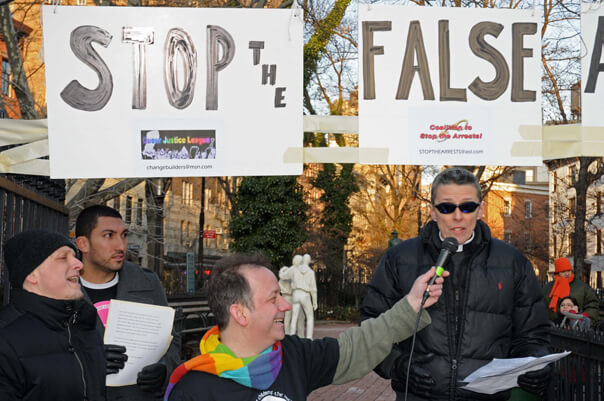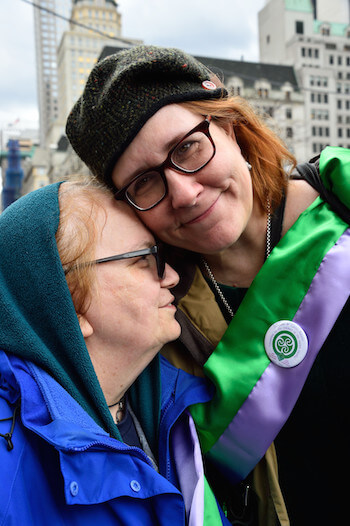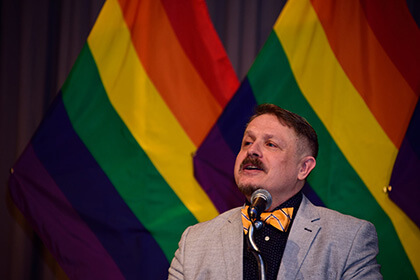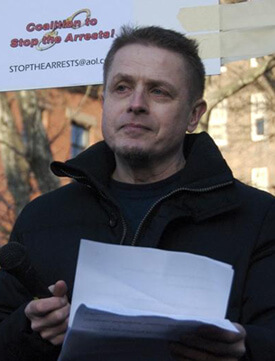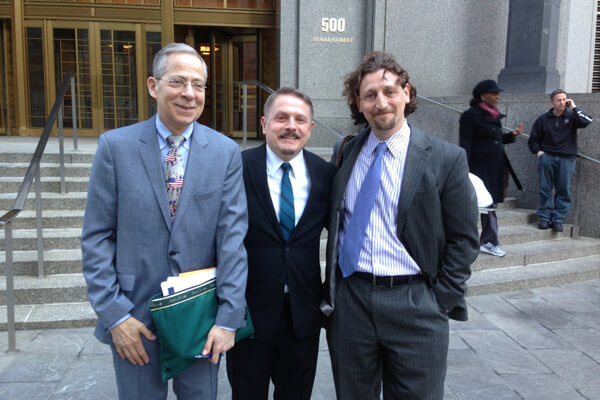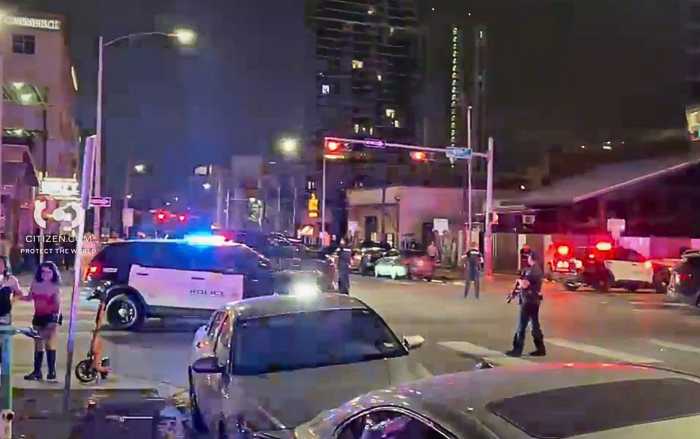A 2009 Sheridan Square rally to protest the arrests of gay men in video stores in Manhattan.
Police department documents filed in a federal lawsuit suggest that racial profiling in addition to the targeting of older gay and bisexual men may have played a role in a series of prostitution arrests that undercover cops made in Manhattan porn shops in 2008.
Of the 41 men police are known to have arrested for prostitution in six porn shops, 18 were Latino and 14 were African-American. Seven were white and two were Asian. Altogether, 78 percent of the men arrested were either Latino or African-American.
One of the men, Robert Pinter, sued the city and the police department in 2009 charging he had been falsely arrested for prostitution. Pinter’s lawyers filed police documents in the case that give the most comprehensive accounting to date of how many men were arrested. The documents did not identify the men, but they did give their arrest dates, age, race, and criminal histories. Previously, Gay City News had more limited information about just 29 men.
Four out of five men arrested were African-American or Latino
The arrests were made by the same group of undercover officers in the Manhattan South Vice Enforcement Squad. According to Pinter and other men who were arrested, they were approached by a younger man, who turned out to be an undercover cop, who aggressively flirted with them. After they agreed to consensual sex, the younger man said he would pay for the sex. The men were then arrested. All of the men Gay City News spoke with said they never agreed to take money. In court filings, the NYPD has conceded that the offer of money first came from the undercover officers.
The NYPD’s legal’s unit, the city’s Law Department, or the Mayor’s Office of Special Enforcement cited the prostitution arrests in nuisance abatement lawsuits that were brought against the porn shops in an effort to shut them down.
Pinter’s conviction, after he was advised to plead guilty to lesser charges, was later vacated and his case dismissed, and the Manhattan district attorney also dropped prosecutions of some other gay defendants. The police actions were widely seen as false arrests by the LGBT community and many elected officials.
In earlier reporting, an obvious pattern identified was that police were targeting older men. That pattern was most apparent in Blue Door Video on First Avenue in the East Village. Nine of the 14 men busted in Blue Door were over 40. Of the 14 men arrested in Blue Door, four were Latino, three were African-American, six were white, and one was Asian.
Men arrested in the other five shops ranged in age from their late teens to early 40s. Among the 27 men arrested in those shops, 14 were Latino, 11 were African-American, one was white, and one was Asian. In those five porn shops, 93 percent of the men arrested were African-American or Latino.
The NYPD records suggest that police were not arresting prostitutes. Of the 14 men arrested in Blue Door, only one had a prior arrest and that was for grand larceny. Among the 41 men arrested in all six shops, 15 had prior arrests with a few with extensive criminal records, but just two out of the 41 had prior arrests for prostitution.
The same vice cops who made the porn shop busts also made at least another 16 prostitution arrests of men and a few women in two Manhattan spas. Those spas were also sued in nuisance abatement lawsuits.
Racial profiling by police is a significant issue in New York City, with it being most pronounced in data on stop and frisk, the police practice of conducting street stops and searches of New Yorkers. Over 80 percent of those stopped and frisked are African-American and Latino.
The NYPD press office did not respond to an email seeking comment.

